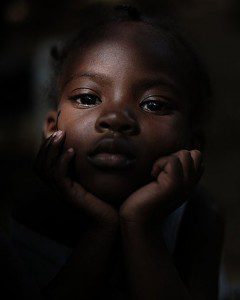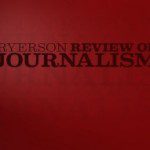To report or to rescue
When is it okay to cross the line from journalist to humanitarian?
Toronto Star columnist Catherine Porter first met the little girl who would pit her journalist’s instincts against her most human impulses on January 24, 2010, almost two weeks after the earthquake that devastated Haiti. The frail two-year-old, who had been pulled from the rubble after nearly a week, was being cared for at a makeshift medical clinic. Porter couldn’t get the child out of her mind , and returned to the clinic three times that week to visit the “little girl with the white tank top, fuzzy braided hair and too-big pink corduroy skirt that keeps slipping down her backside.” Today, she says, “In retrospect, I always had this kind of maternalistic sense of responsibility.”
Three months later, when the Starsent Porter back to Haiti, she found that a miracle had happened: the toddler, Lovely Avelus, had been reunited with her extended family, including her mother, father, and one-year-old brother.
But while Lovely was one of the lucky ones by post-earthquake standards, life for her and her family was still hard. The nine of them lived in a leaky metal shed roughly the size of a janitor’s closet, and it wasn’t uncommon for them to go more than a day without a full meal. Porter, the mother of a girl and boy, then three and one, saw something of herself in Lovely’s mother, Rosemene Meristil. “I could put myself in her shoes,” she says. “I could say to myself, I know what it is to have kids who won’t go to sleep, and my kids sleep in beds, not on the floor of a hut. I know how often my kids want to eat.”
So when Meristil told Porter how she’d always dreamed of sending Lovely to school but had lost her savings in the earthquake, Porter immediately offered to pay the $300 annual tuition. “I didn’t think through the ramifications of what it would mean, what my role as a journalist was. It seemed like there were a million tragedies around me, and here was one easy thing I could help with.”
Sue Montgomery, a justice reporter with The Gazette in Montreal who arrived in Haiti days after the quake, was also moved by the million tragedies. As she later wrote for J-Source, “[T]he stories were never ones that I could keep at arm’s length, as I would in Montreal. I became known in my newsroom back home as a one-woman humanitarian organization. I bought food for the orphanage. I counselled new moms with their newborns, soliciting help from my midwife sister in Toronto…. While at a ‘clinic’ in one of the tent cities…I set down my pen and notepad and helped a woman in labour, helped stitch up a gaping wound in a man’s head, fed what little food I had to an elderly man laid out flat with back and leg fractures.” Now, she says of her involvement, “I just felt like it was the least I could do while I was there.”
•••
Journalists have traditionally been instructed to turn their own emotions off and avoid getting personally involved with the story they’re covering, no matter what tragedies they witness. For example, the Canadian Association of Journalists’ ethics guidelines call for journalists to be “fair and impartial observers,” while in the U.S. the Society of Professional Journalists’ ethical code mandates that reporters “be free of obligation to any interest other than the public’s right to know.”
The rationale for this disinterested approach is that if reporters get too emotionally invested, it gets harder to report without bias. You’re supposed to gather the facts, write the story, and move on. As Brussels-based Csilla Szabó, staff director of the Center for International Media Ethics (CIME) , says in an email regarding Porter’s taking on Lovely’s school fees, “One might argue that it would have been more appropriate for the journalist to refer the Haitian family to a relevant organisation that provides assistance in funding education in these specific kinds of circumstances.” By getting directly involved, Szabó warns, a journalist “might make their reporting on the issue subjective and their article less credible.”
And this makes sense, at least in theory. The notion is that by disconnecting themselves from their emotions, journalists can focus on delivering the most truthful, effective story possible. Bill Kovach and Tom Rosenstiel argue in their book The Elements of Journalism, “[I]t is vital to maintain some personal distance in order to see things clearly and make independent judgements.”
But try as they might to be perfectly objective, journalists are human beings. What if their sense of humanity outstrips their journalistic training? What if sometimes it’s impossible not to step in and help?
•••
After a bit of thought, Porter told Lovely’s mother she would pay Lovely’s tuition for two and a half years, as well as that of her cousin and a neighbour. She also pledged to give the family $100 each month for six months to help cover living expenses. In total, this aid was the equivalent of a few mortgage payments, but a life-changing amount for Lovely’s family.
Upon returning to Toronto, Porter wasn’t even sure that she’d write about helping the family. After all, it was a decision she’d made as a mother and a human being, not as a representative of the Star. Before Lovely, the Star was simply reporting on the earthquake in Haiti, but Porter kept thinking about Lovely’s story. Finally, her editor, Alison Uncles, urged her to write the piece. “You’re a columnist,” Uncles told her. “You can write about what you like.”
•••
It’s obviously a conflict of interest when a reporter is influenced by a wealthy, powerful source, or directly offers money for an interview. But in a case like Porter’s, where the person she helped was an impoverished toddler, is there really a risk of bias?
Tracy Rosenberg, California-based executive director of watchdog group Media Alliance, says in an email that dealing with less powerful sources carries less risk, but when befriending any source, “there can be conflicts between the requirements to tell the story and what might be acts of friendship.”
Jeffrey Dvorkin, former National Public Radio ombudsman and vice president of news, and director of the University of Toronto Scarborough’s journalism program, is less by-the-book. “Their first obligation is to get the story,” he says of reporters who find themselves in a crisis, “but there are obviously moments when a journalist will find himself in a situation where journalism is secondary to his instincts to do the right thing. Journalists need to be able to exercise their conscience, and if they can do that and not interfere with this obligation, that opportunity should be sought out and acted on.” Stephen Ward, director of the Center for Journalism Ethics for the University of Wisconsin in Madison and the author of Global Journalism Ethics, agrees: “If, at the same time [as reporting a story], without compromising their impartiality, a journalist could also help someone in trouble, then I think that’s perfectly okay.”
Of course, sometimes reporting on a crisis may be more effective in the long run than directly intervening. Paul Chapman, senior news editor of Vancouver’s The Province, says in an email that while journalists should step in when someone is in immediate danger or pain, focusing their efforts on reporting can be more helpful when it comes to long-term humanitarian issues. “If you were covering a war and saw a citizen get shot and they needed help, I think it’s your duty as a human to help out the victim. If you’re covering the aftermath of an earthquake and you are to tell the story, then I think you deal with the story and not with helping clear wreckage.”
American war journalist David Axe is someone for whom the shooting example is not hypothetical. In 2008, while covering a conflict in Chad, he watched a man involved in the clash get shot. Axe chose to film him as he lay dying, then fled when the shooting began again, though he did consider helping the injured. Still, he says, “That’s not what I do. At what point would I cease being a journalist and start being a humanitarian?” Axe adds, “One can be a journalist and a humanitarian, but sometimes not at the same moment.” With no first-aid expertise and shots being fired around him, Axe saw helping as a futile suicide mission, and he felt documenting the man’s death would be for the greater good. His justification: “I accept that what I can do about this is to do my job. I do work for the good of mankind. I do an important job. That job is at least as important as stopping to help.”
Fred Brown, vice chair of the Society of Professional Journalists’ ethics committee, thinks extreme detachment is abhorrent. “If you are in the position to save someone’s life and you don’t do it, it’s terrible. That’s absolutely not only a crime against humanity, it’s using what I call the journalistic excuse to maybe not put yourself at risk.”
In Haiti, Montgomery was puzzled to observe fellow reporters shying away from involvement. “I just couldn’t believe it. I mean, they were upset about the situation, I think, but for them it was a clear line. They were there as a journalist and that was it, they weren’t going to help.”
Szabó of CIME seems less taken aback: “If the journalist is genuinely concerned about the livelihood of [a] source, the best option might be to alert relevant authorities or organisations who can offer an appropriate form of assistance, so that the journalist can focus solely on reporting.”
But in Haiti, there was no one to turn to. Few aid agencies were able to get into the country soon after the earthquake, and people were in dire circumstances. “It wasn’t like an emergency would be here, where you would have ambulances and police responding,” Montgomery says. “Anybody who had all their limbs and wasn’t injured had to pitch in.”
And just as Porter and Montgomery stepped in in the aftermath of the Haitian earthquake, reporters were seen breaching customary journalistic boundaries after Hurricane Katrina in 2005. Chris Merrifield, promotions producer of New Orleans’ WWL-TV, pulled a driver out of a sinking car, for example, while NBC reporter Kerry Sanders gave food to a sick, elderly man who’d been staying on the floor at the airport. A CBS news crew’s boat rescued a man marooned in the middle of the water on an inflatable mattress, and ABC’s Bob Woodruff passed out water and food.
Despite their departure from the model of journalistic detachment, the public response to Porter’s and Montgomery’s actions was largely supportive. One blogger wrote that Porter’s coverage “reminds us once again of the power we all have to make this world a slightly better place;” responding to Montgomery’s J-Source piece, a reader wrote, “[I]t was courageous of you to help out on the spot, be fearless and just do what was right in your heart.”
At one time, Politico White House editor Rachel Smolkin would not have been among those praising Porter and Montgomery. In a 2006 piece for the American Journalism Review, she wrote about participating in a journalism ethics symposium and being appalled by those who said they’d help deliver food to starving people while on the job. But after speaking with journalists who had helped out during Hurricane Katrina, Smolkin reconsidered her black-and-white approach to ethics, concluding that “your humanity—your ability to empathize with pain and suffering, and your desire to prevent it—does not conflict with your professional standards.”
This suggests journalists are less likely to be criticized for helping victims of natural forces than for engaging in advocacy. Nearly every news organization still frowns upon reporters taking political sides. Ward advises journalists to be cautious when “you identify with a group very much so, and your reporting takes on the appearance of advocacy,” while the CBC code of conduct states that those reporting on elections “are restricted from engaging in political activity or from taking public positions on matters of public concern or controversy.”
•••
With Lovely in school and her column published, it seemed Porter’s role as pseudo aid worker had come to an end. But then the emails began pouring in. Within an hour, Porter had heard from close to 100 readers wanting to give her money to help Haiti. Next came the cheques.
“At first I kept refusing and saying, ‘I don’t do this. Check out this NGO,'” she says. “But people were saying, ‘No, I want you to do exactly what you did, and I want you to do it for me.'” Before long, Porter had $30,000 of readers’ money and no idea what to do with it. As a columnist, once or twice she’d forwarded letters and donations from readers to the people she’d written. Now readers were requesting that she actively change the story.
So Porter sat down with her editors to figure out a plan for the money. The group decided that instead of just reporting on aid and change in Haiti, they’d integrate involvement with it into the paper’s coverage. Porter would use the readers’ donations to fund scholarships for Haitian students, documenting the process in the Star. She would also write more columns about Lovely, for what became a long series of articles and videos called “Lovely’s Haiti.” “In a way, I think it was brilliant,” Porter says, “because as a journalist you feel like you’re exploiting people when you use their stories.”
•••
From Tracy Rosenberg’s perspective, Porter and her editors did the right thing in being open about Porter’s involvement with Lovely and her family. The Media Alliance executive director says that journalists who intervene in people’s lives while reporting “must write about it, or they are not being honest with their public about what they experienced in this crisis zone and what set of experiences are forming their report of what was happening.” Ross Howard, journalism teacher at Langara College in Vancouver and chairman of Media & Democracy Group , a Canadian non-profit that trains international journalists, criticizes news crews that “intervene and disclose simply for personal or corporate promotion.”
This cynical practice seems to be a growing phenomenon. With traditional news consumption faltering and public social consciousness on the rise, some news outlets are allowing their journalists to help sources in order to build their own reputation as a caring organization, and news audiences are increasingly demanding this sort of coverage. U of T’s Jeffrey Dvorkin shares Howard’s distaste with this development. He points to Anderson Cooper’s Haiti coverage, in which Cooper was seen intervening. “I’m sure he felt a great instinct to help these people,” Dvorkin says, “but it made for great television. Sometimes gestures are simply that, just gestures.”
So journalistic ethics have grown murkier as reporters try to balance their profession’s demand for objectivity with the desires of the public and the pangs of their own consciences. Rosenberg thinks that more conversation about the issue is needed. “Some of the ‘objectivity’ conversation is becoming more nuanced than it used to be, and that is a good thing,” she says. “Journalists are rarely robots, and the presumption that they should act [like them] does not offer a good model for what people experience [when] reporting.”
Dvorkin urges newsrooms to discuss the issue of obligations before journalists are sent out to cover humanitarian crises. “There hasn’t been enough clarity in the past, and they have to have some clarity in their own minds about how best to respond and feel free to talk about it in their news organizations.”
Porter is still mulling over her own views on journalistic detachment. All she knows for sure is that over two years after the earthquake, she still thinks about Lovely every single day. A picture of the little girl sits on her bedside table.
“She’s not just a story for me anymore.”
Photographs of Lovely Avelus by Lucas Oleniuk. Photograph of Sue Montgomery by Phil Carpenter, Montreal Gazette.
by Jillian Bell
This is a joint byline for the Ryerson Review of Journalism. All content is produced by students in their final year of the graduate or undergraduate program at the Ryerson School of Journalism.













































